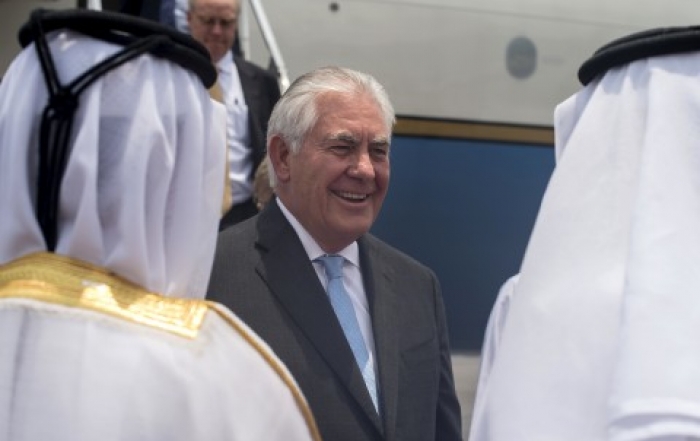The agreement Tillerson signed, weeks in the making, calls for the United States and Qatar to share information to track down sources of funding for terrorism for years to come.
“The United States has one goal — to drive terrorism off the face of the earth,” Tillerson said in a news conference in Doha.
Tillerson is in the middle of four days of hopping around the Persian Gulf to try to get negotiations going between Qatar and the countries that have imposed a trade and diplomatic embargo on it, led by Saudi Arabia, Bahrain, the United Arab Emirates and, beyond the gulf, Egypt.
The dispute is at an impasse after the four countries made 13 demands that Qatar rejected as an attack on its sovereignty. They include Qatar’s stopping its alleged financing of terrorist groups and closing the Qatar-based news network Al Jazeera, which reports critically on the region’s governments.
Tillerson has said some of the demands are worth discussing, but some appear to be peripheral to any concerns about terrorism. And on Tuesday, after meeting with Kuwaiti officials, Tillerson told reporters he found Qatar’s positions to be “reasonable.”
Tillerson portrayed the agreement between Qatar and the United States as distinct from the Qatar crisis. But he flies to the Saudi city of Jiddah on Wednesday for talks Thursday with foreign ministers of the four countries leading the boycott against Qatar, and seemed to be messaging them that the diplomatic squabble is a distraction from forming a unified front to combat terrorism.
The Trump administration worries that the embargo against a country where the United States has a large air base could affect counterterrorism operations and push Qatar further into the arms of Iran. Tehran has allowed Qatar to use its air and sea lanes after the gulf states suspended all flights to and from Doha and severed diplomatic ties.
The dispute, however, appears to be intensifying. This week, on the eve of Tillerson’s arrival in the region, documents were leaked purporting to show secret agreements that Qatar had signed several years ago consenting to not support the Muslim Brotherhood or other groups opposed to its Persian Gulf neighbors.
The Saudi-led bloc made little effort to hide its role in leaking the documents, which were first reported by CNN. In a joint statement carried by the Saudi press agency, the Arab states said that the agreements “confirm beyond any doubt Qatar’s failure to meet its commitments.”
During the current crisis, the gulf states have linked Qatar to a host of opposition and militant groups in the region. In a statement on the leaks, Qatar said that its opponents had undertaken “a campaign of duplicity and subterfuge rather than pursue their complaints through established GCC mechanisms,” referring to the six-nation Gulf Cooperation Council.
Other leaks during the crisis, from a group apparently sympathetic to Qatar, have sought to embarrass Doha’s adversaries, in particular the UAE. The group has widely shared with journalists apparently hacked emails from the account of Yousef al-Otaiba, the UAE’s ambassador to the United States.
The emails have highlighted the UAE’s determination over years to rally Washington thinkers and policymakers to the country’s side on the issues at the center of its dispute with Qatar. In a 2014 email to David Rothkopf, then-editor of Foreign Policy, Otaiba wrote that the Middle East was “in a cold war.”
“Qatar, turkey, hamas, and muslim brotherhood on one team. UAE, saudi, egypt, jordan, and israel on the other team. We see ourselves as the moderate, secular faction while qatar champions the extremist/radical political islamist team,” Otaiba wrote. “I think there is a notion that talking to them will make them more moderate,” he added. “Needless to say, we don’t believe that works.”
A spokesman for Otaiba said the ambassador “will not comment on information/emails that may have been stolen from the Ambassador’s account and will not assist in authenticating any of the information,” adding that “patently false and selective information has been distributed by parties clearly adverse to the Ambassador.”
Tillerson is unlikely to find the going any easier on Thursday. Last Friday, the Egyptian Foreign Ministry said Qatar should be kicked out of the multinational coalition, calling it “unacceptable for the coalition to have among its members states that support terrorism or advocate for it in their media.”
More about: #Terrorism
















































